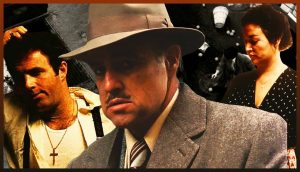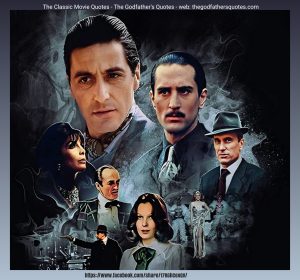
Few movie lines travel across languages and generations the way quotes from The Godfather do. Released in 1972 and directed by Francis Ford Coppola from Mario Puzo’s bestselling 1969 novel, the film reshaped modern cinema, won Best Picture at the Academy Awards, and introduced characters whose words still echo worldwide. Its sequel, The Godfather Part II (1974), also won Best Picture-an unmatched one-two achievement that helped cement the saga’s place in history. This article brings the facts-and explains why those lines matter to teens discovering the films today and to fans who first saw them in theaters.
The single most famous line-“I’m gonna make him an offer he can’t refuse.”-appears in all three films and ranked near the very top of the American Film Institute’s greatest movie quotes. It captures the trilogy’s central tension: power wrapped in politeness. Spoken by Don Vito Corleone (Marlon Brando) and later echoed by Michael Corleone (Al Pacino), the sentence is calm, rhythmic, and terrifying. That contrast-soft words, hard consequences-makes it unforgettable.
Another line that crosses borders is “It’s not personal, Sonny. It’s strictly business.” In one scene, Michael insists that removing emotion leads to smarter choices. In life, of course, decisions are rarely that simple, and the movies know it: Michael’s transformation from quiet war hero to calculating don is one of cinema’s great character arcs. That arc is a big reason the trilogy remains relatable to young viewers today. It asks a timeless question: What do you sacrifice to protect your family or your future?
“Leave the gun. Take the cannoli.” was partly improvised on set by Richard S. Castellano (Peter Clemenza). It’s darkly funny, rooted in character, and instantly human. Small details like this-food, family rituals, wedding music-sit beside boardroom meetings and betrayals. The mix of everyday life and high stakes is why people who’ve never seen a gangster in real life still see themselves in these scenes.
In Part II, Michael reflects, “Keep your friends close, but your enemies closer.” The film intercuts his rise with flashbacks of young Vito (Robert De Niro, who won an Oscar for the role) building a community out of nothing as an immigrant in early-20th-century New York. This double story-how power is won and how it’s kept-gives new generations two entry points: the dreamer who builds and the leader who protects.
A few production facts help explain the quotes’ longevity. The films pair Nino Rota’s haunting themes with Gordon Willis’s famously shadowed cinematography, earning Willis the nickname “Prince of Darkness.” That visual style makes dialogue land like a whisper in a quiet church-intimate, weighty, and memorable. Historically, The Godfather dominated 1972’s box office and culture; Brando won Best Actor (famously declining the Oscar in a televised moment now taught in film history classes), and the script by Coppola and Puzo became a model for literary adaptations. Decades later, the trilogy has been restored in 4K and re-released for anniversary screenings, bringing the lines to new audiences in theaters and at home.
Crucially, the dialogue works beyond English. Dubbed and subtitled versions keep the rhythm of the original lines, and fans worldwide trade them online as advice, humor, or life lessons. Business schools dissect them as leadership case studies. Creators remix them into memes. Parents quote them jokingly at family dinners. That cultural reach isn’t an accident; it’s the result of precise writing and performances that communicate emotion with a glance as much as with words.
Here are four quotes, the moment they appear, and what they mean-fact first, interpretation second:
1) “I’m gonna make him an offer he can’t refuse.”
Where: Vito explains his persuasive method in Part I; Michael later repeats the philosophy.
Why it lasts: It’s a masterclass in euphemism-threat and negotiation fused into one elegant sentence.
2) “It’s not personal… it’s strictly business.”
Where: Michael counters Sonny’s anger in Part I while planning a pivotal meeting.
Why it lasts: It promises rationality, but the trilogy shows the cost of living by that rule.
3) “Leave the gun. Take the cannoli.”
Where: After a hit in Part I, Clemenza preserves normalcy amid chaos.
Why it lasts: Humor and horror side-by-side-pure human truth under pressure.
4) “Keep your friends close, but your enemies closer.”
Where: Michael in Part II, reflecting on strategic survival.
Why it lasts: It’s practical wisdom, not bravado-strategy framed as calm discipline.
For those encountering the films for the first time: start with Part I to meet the Corleone family, then Part II for the past-and-present design that many critics call one of the medium’s finest achievements. Part III (1990) closes Michael’s story; later restorations improve its rhythm and clarity. Watch with subtitles even if you’re fluent; you’ll appreciate the careful wording and the performances’ small inflections.
Finally, a note on using these quotes in life. The movies aren’t instruction manuals for real-world conduct-they’re cautionary tales about ambition, loyalty, and the price of power. The best way to “live” the quotes is to understand the choices behind them: loyalty without cruelty, strength without losing your soul, family without forgetting fairness. That’s what keeps young and old, in every country, returning to these lines year after year.
If you love classic lines, you’re in the right place. At thegodfathersquotes.com and on The Classic Movie Quotes page, we celebrate the words that shape scenes-and the scenes that shape us. Read, share, and pass them on to the next generation. The family grows when the quotes live.






Another excellent article
Keep reading our Articles